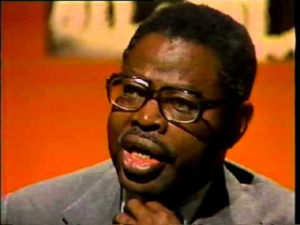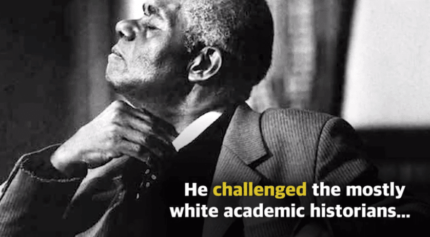
It was only fitting that one of the most courageous and inspiring scholars of our time would live for nearly a century, paying personal witness to dramatic transformations in the lives of Black people across the globe. But more than anyone, Dr. Ben—as he was affectionally called by generations of his devoted followers—knew that a world transformed was not a world complete. Black people might have lifted themselves from widespread subjugation, but they still suffered and were far from the glorious civilizations in Africa about which Dr. Ben taught millions of eager charges.
One of his many specialties was the ancient civilization of Kemet in Egypt. He was one of the first true Egyptologists, before that title had even come into vogue. Dr. Ben was always a controversial figure because he had no interest in trying to placate white scholars or writers who were threatened by his claims about Africa, Europe and the Middle East.
Because generations of white orthodoxy had moved the Western world to accept as fact questionable scholarship about the preeminence of European rulers and thinkers, Dr. Ben was always willing to take down these Western myths, one by one.
Dr. Ben turned 97 on New Year’s Eve and had plans to celebrate many more. But his friends took note of his diminishing appetite—though close colleagues like Dr. Leonard Jeffries and Prof. James Small were forced to go onto the Internet earlier this month to debunk rumors that he had already passed. At 3:30 am on Thursday morning, he bid his farewell.
“He was one of last great race men of his era,” Nayaba Arinde, Amsterdam News Editor, said on the Amsterdam News website. “He was a master teacher who just wanted to share our amazing African history. He was a man of the people. He was always amongst us, educating, and sharing. Sitting with him was a gift of tremendous proportions. He was loved, and he loved his people.”
He was like a library of African history onto himself, as if a wing of one of the world’s great research institutions had been poured into one brain and become ambulatory.
For those in the New York tri-state area in the 1970s and 1980s, he was a familiar presence and voice from his frequent appearances on Gil Noble’s weekly Black-focused television show “Like It Is” and on the Afrocentric radio station WLIB. It was an important time for him to spread his teachings about the glory of ancient African civilizations—coming out of the tumult of the Civil Rights Movement and the uplifting of the Black Power Movement, young Black people were eager to soak up his words, to extend their communion with their past far beyond the enraging lessons of slavery.
He often worked together with another legendary scholar, Dr. John Henrik Clarke, who died in 1998.
During his immense life, Dr. Ben journeyed from his birth in Ethiopia, to a Puerto Rican mother and an Ethiopian father, studying in institutions ranging from Puerto Rico to Cuba to Brazil to Spain. After earning a B.S. in Civil Engineering at the University of Puerto Rico, he went on to earn a Master’s degree in Architectural Engineering from the University of Havana, Cuba and then doctoral degrees in Cultural Anthropology and Moorish History from the University of Havana and the University of Barcelona, Spain.
He taught many years at such institutions as City College in New York City and Cornell University.
His authorship extended to 49 books, many focusing on Egypt and the civilizations of the Nile Valley.
In 2002, Dr. Ben—who lived in Harlem his later years—donated to the Nation of Islam his personal library of more than 35,000 volumes, manuscripts and ancient scrolls.
“Of all our greats, Dr. Ben physically took tens of thousands of scholars, activists, students and associations to the Nile Valley to make the pages of his book more authentic,” said his colleague, Reggie Mabry. “We saw our own experiences of what he wrote… For that the Black world is indebted to this Black man of the Nile and his family.”
https://youtu.be/KhzgO4UeshY


